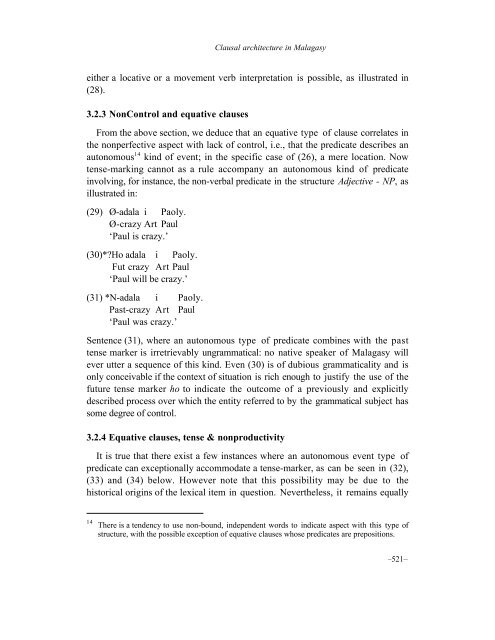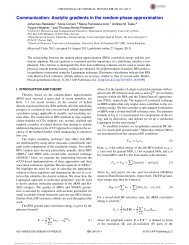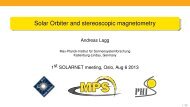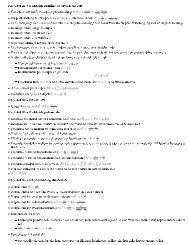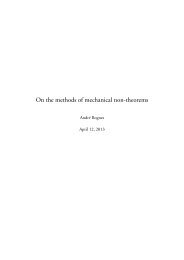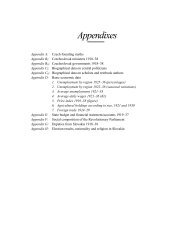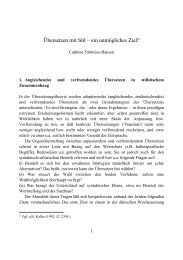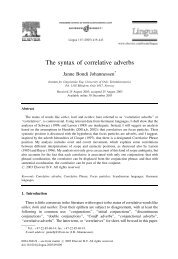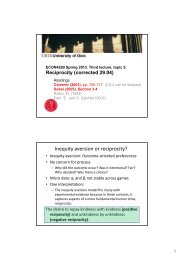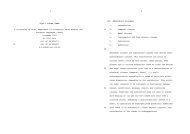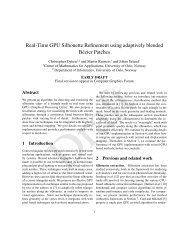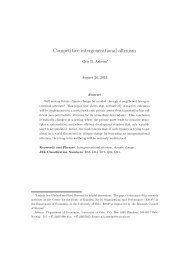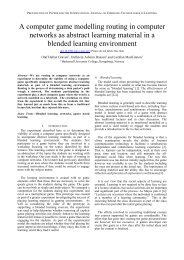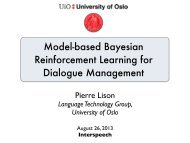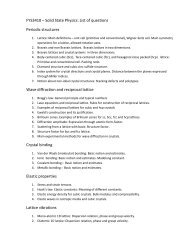Clausal architecture and movement verbs in Malagasy
Clausal architecture and movement verbs in Malagasy
Clausal architecture and movement verbs in Malagasy
Create successful ePaper yourself
Turn your PDF publications into a flip-book with our unique Google optimized e-Paper software.
<strong>Clausal</strong> <strong>architecture</strong> <strong>in</strong> <strong>Malagasy</strong><br />
either a locative or a <strong>movement</strong> verb <strong>in</strong>terpretation is possible, as illustrated <strong>in</strong><br />
(28).<br />
3.2.3 NonControl <strong>and</strong> equative clauses<br />
From the above section, we deduce that an equative type of clause correlates <strong>in</strong><br />
the nonperfective aspect with lack of control, i.e., that the predicate describes an<br />
autonomous 14 k<strong>in</strong>d of event; <strong>in</strong> the specific case of (26), a mere location. Now<br />
tense-mark<strong>in</strong>g cannot as a rule accompany an autonomous k<strong>in</strong>d of predicate<br />
<strong>in</strong>volv<strong>in</strong>g, for <strong>in</strong>stance, the non-verbal predicate <strong>in</strong> the structure Adjective - NP, as<br />
illustrated <strong>in</strong>:<br />
(29) Ø-adala i Paoly.<br />
Ø-crazy Art Paul<br />
‘Paul is crazy.’<br />
(30)*?Ho adala i Paoly.<br />
Fut crazy Art Paul<br />
‘Paul will be crazy.’<br />
(31) *N-adala i Paoly.<br />
Past-crazy Art Paul<br />
‘Paul was crazy.’<br />
Sentence (31), where an autonomous type of predicate comb<strong>in</strong>es with the past<br />
tense marker is irretrievably ungrammatical: no native speaker of <strong>Malagasy</strong> will<br />
ever utter a sequence of this k<strong>in</strong>d. Even (30) is of dubious grammaticality <strong>and</strong> is<br />
only conceivable if the context of situation is rich enough to justify the use of the<br />
future tense marker ho to <strong>in</strong>dicate the outcome of a previously <strong>and</strong> explicitly<br />
described process over which the entity referred to by the grammatical subject has<br />
some degree of control.<br />
3.2.4 Equative clauses, tense & nonproductivity<br />
It is true that there exist a few <strong>in</strong>stances where an autonomous event type of<br />
predicate can exceptionally accommodate a tense-marker, as can be seen <strong>in</strong> (32),<br />
(33) <strong>and</strong> (34) below. However note that this possibility may be due to the<br />
historical orig<strong>in</strong>s of the lexical item <strong>in</strong> question. Nevertheless, it rema<strong>in</strong>s equally<br />
14 There is a tendency to use non-bound, <strong>in</strong>dependent words to <strong>in</strong>dicate aspect with this type of<br />
structure, with the possible exception of equative clauses whose predicates are prepositions.<br />
–521–


